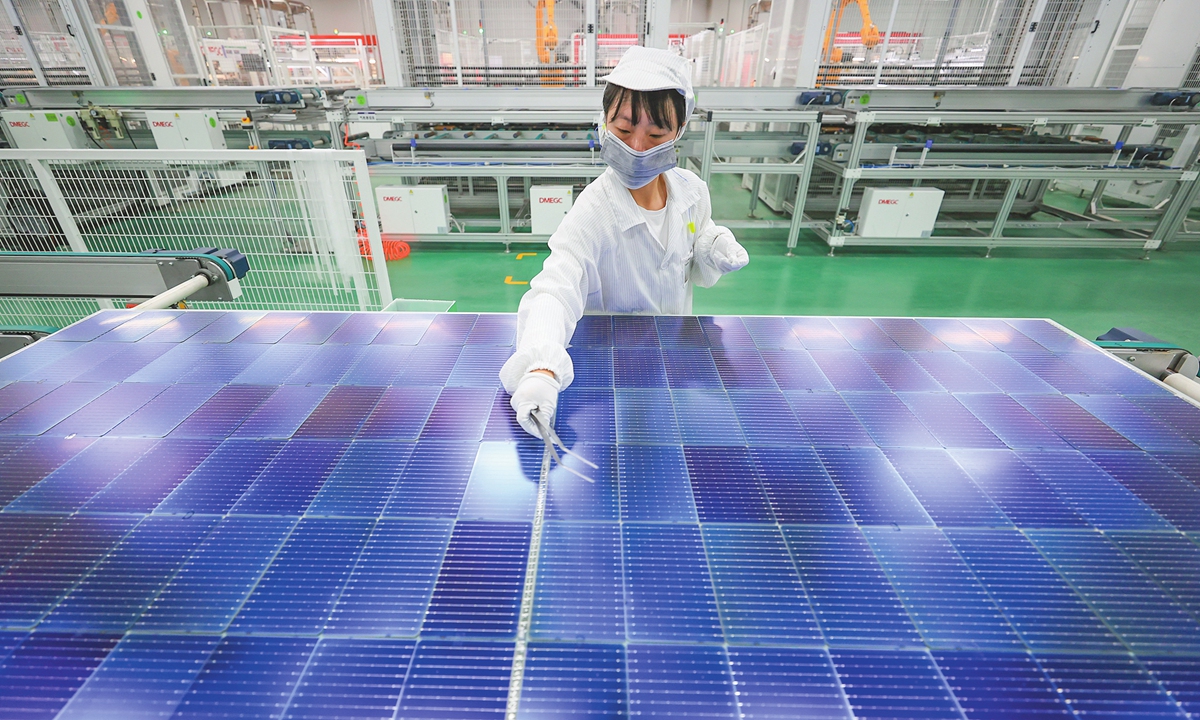
A worker rushes to fulfill orders on the production line at a photovoltaic company in Lianyungang, East China's Jiangsu Province on December 25, 2024. From January to October, production of polysilicon, silicon wafers, cells, and modules for photovoltaics increased by more than 20 percent year-on-year, and the export volume of photovoltaic cells rose by more than 40 percent, official data showed. Photo: VCG
China Energy Storage Alliance (CNESA) organized a closed-door seminar in Beijing on Thursday to address involution-style competition in the new energy storage sector, with participation from nearly 30 industry-leading companies, an employee with the alliance confirmed to the Global Times on Thursday without further elaboration.
A document obtained by Jiemian News indicates that the meeting covers three main discussion topics, one of which addresses "anti-involution competition and anti-below-cost price competition," and measures to prevent bidding below cost.
The event also focused on discussions on measures to curb "involution," including increasing entry thresholds, standardizing technical conditions, improving the standards system, enhancing safety protection levels, and restraining local capital from impulsive investing.
At the meeting, industry participants also discussed promoting high-quality development in new energy storage and the direction of key technological advancements.
The call to reject involution is a positive one, as it seeks to promote healthy and sustainable industry growth, Lin Boqiang, director of the China Center for Energy Economics Research at Xiamen University, told the Global Times on Thursday. .
The central authorities have also urged governments of various levels to take necessary measures to prompt industries to strengthen self-discipline and prevent vicious "involutionary" competition.
During the annual Central Economic Work Conference held in Beijing from December 11 to 12, it urged "addressing rat-race irrational competition and regulating behaviors of local governments and enterprises," Xinhua reported.
This followed a meeting held on July 30 of this year by the Political Bureau of the Communist Party of China Central Committee, which pointed out that "it is a must to reinforce industry self-discipline to prevent vicious 'involution' competition. Market competition mechanism must be strengthened to ensure smooth channels for the exit of outdated and inefficient production capacities," as Xinhua reported.
On Tuesday, two domestic large silicon material companies Tongwei Co and Xinjiang Daqo New Energy Co announced via their official WeChat accounts that, to curb 'involution' and prevent 'vicious' competition, the two silicon material companies will implement orderly production cuts and control production.
Noticeably, Yongxiang Co, a subsidiary of Tongwei, has a high-purity crystalline silicon production capacity of over 900,000 tons and has maintained the highest market share globally for several consecutive years, domestic news portal ce.cn reported, noting that the production cuts initiated by leading companies will have a significantly positive impact on the industry.
Commenting on the moves by industry players, Lin said that "combating industry 'involution' aligns with high-quality development... and if industry professionals can better self-regulate, it will be a win-win situation for long-term."
On December 5, at the 2024 Annual Conference of the PV Industry, the China Photovoltaic Industry Association organized 33 leading industry companies to sign an industry "self-discipline agreement," Xinhua reported. This agreement calls for PV companies to voluntarily limit production and prices, the report said.
Additionally, the association vowed to deploy a professional team for on-site verification of production capacity at over 300 photovoltaic bases nationwide, said the report.




